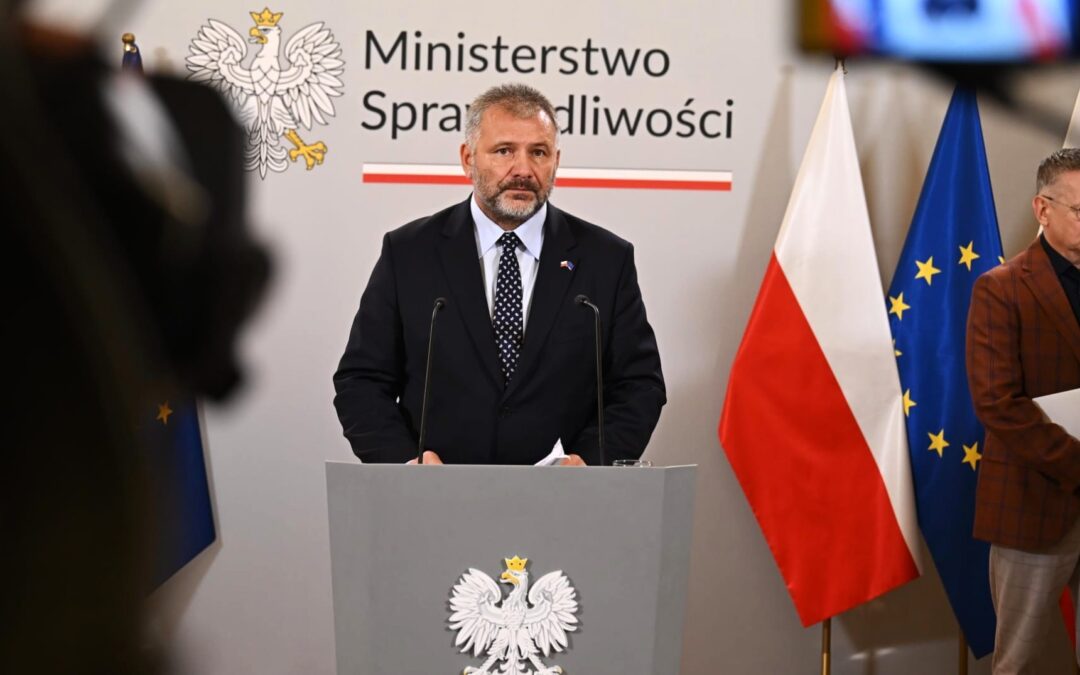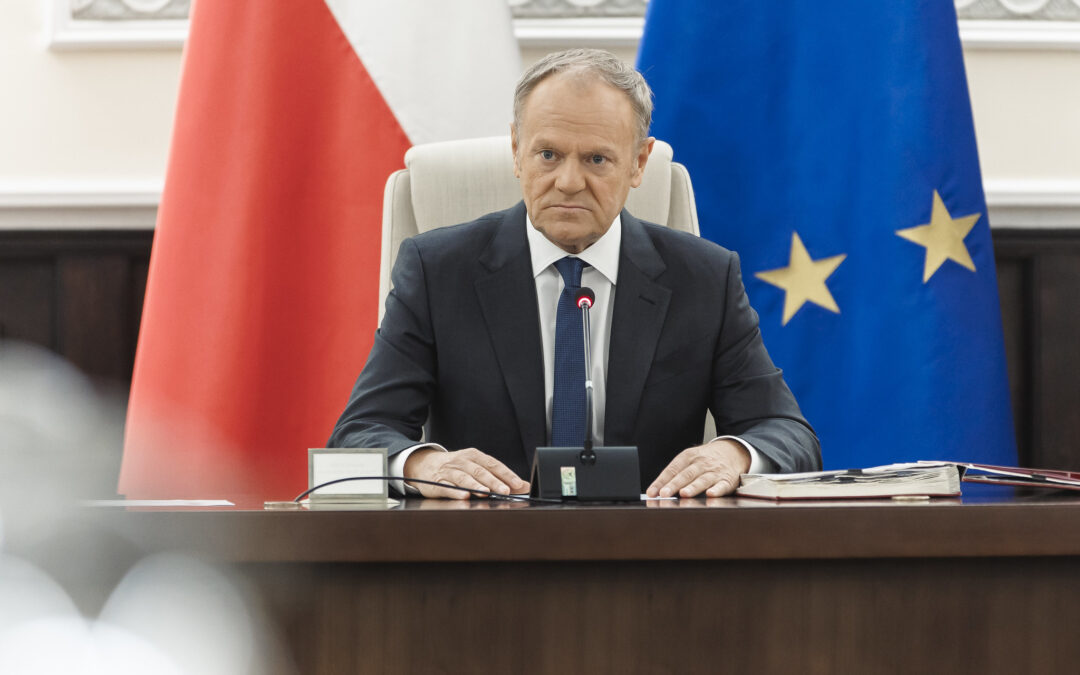Keep our news free from ads and paywalls by making a donation to support our work!

Notes from Poland is run by a small editorial team and is published by an independent, non-profit foundation that is funded through donations from our readers. We cannot do what we do without your support.
Waldemar Żurek, Poland’s justice minister and prosecutor general, has requested that the legal immunity of Bogdan Święczkowski, the chief justice of the Constitutional Tribunal (TK), be lifted so that Święczkowski can face charges of abusing his powers.
The accusations relate to the time when Święczkowski served as a senior prosecutor under the former Law and Justice (PiS) government, and specifically to his role in allegedly accessing and making copies of surveillance of an opposition-linked lawyer.
The request marks a further development in efforts by the current government, which came to power in December 2023, to hold to account PiS-era officials for alleged offences.
Prokurator Generalny Waldemar Żurek skierował dziś do Trybunału Konstytucyjnego wniosek o wyrażenie zgody na pociągnięcie do odpowiedzialności karnej sędziego i Prezesa Trybunału Konstytucyjnego Bogdana Święczkowskiego. ⬇️https://t.co/EbazCgQWrf
— Prokuratura (@PK_GOV_PL) September 30, 2025
On Tuesday, Anna Adamiak, the spokeswoman for Żurek’s office, announced that the prosecutor general had submitted an application to the TK for consent to bring criminal proceedings against Święczkowski.
She noted that the basis for the request was evidence collected by a special team of prosecutors set up last year by Żurek’s predecessor, Adam Bodnar, to investigate the use of Pegasus spyware under the former PiS government.
That investigation has led to “a sufficiently justified suspicion that Bogdan Święczkowski committed a prohibited act” in the years 2020 and 2021 when serving as national prosecutor by “directing the execution of a crime” with “premeditated intention”.
His actions comprised asking another prosecutor, Paweł Wilkoszewski, to review surveillance activities conducted against Roman Giertych, who was at the time a prominent lawyer and close associate of then opposition leader Donald Tusk.
Tusk is now the prime minister and Giertych is an MP representing Tusk’s centrist Civic Platform (PO). Giertych is among a number of PO-linked figures who were surveilled using Pegasus when PiS was in power.
This year, PiS-linked media outlets published recordings of a private phone conversation between Tusk and Giertych that is believed to have been recorded using Pegasus.
A recording of a private phone call involving @donaldtusk when he was president of the European Council has been published by opposition media.
Tusk's former lawyer says it was made through illegal surveillance by the then government using Pegasus spyware https://t.co/8yzblKMjgo
— Notes from Poland 🇵🇱 (@notesfrompoland) June 16, 2025
Prosecutors believe that Święczkowski’s order for Wilkoszewski to access material on Giertych went beyond the legally permitted scope “because it was aimed at obtaining information about [Giertych’s] personal and professional life and political activity, as well as about the subject of cases conducted by him as an attorney”.
Święczkowski was aware that the latter material contained parts legally protected by attorney-client privilege, say prosecutors, who also accuse Święczkowski of unlawfully copying that material onto DVDs.
Among Giertych’s clients affected by this alleged violation of attorney-client privilege were Stanisław Gawłowski, a senior PO politician, and Leszek Czarnecki, a businessman who claimed to have been politically targeted by the PiS authorities.
“The very fact of ordering such an inspection [of material on Giertych], of course without authorisation, constituted a violation of the law, but the essence of Bogdan Święczkowski’s abuse of power when issuing this order was that he was aware the materials contained information concerning attorney-client privilege,” said Adamiak.
Former justice minister @ZiobroPL confirmed that he played a key role in the purchase of Pegasus spyware during testimony to a parliamentary commission.
He was forcibly brought there for questioning by police after previously failing to appear https://t.co/bX6moYObFy
— Notes from Poland 🇵🇱 (@notesfrompoland) September 30, 2025
If convicted of the crimes he is accused of, Święczkowski could face a prison sentence. However, before charges can be brought, his legal immunity must be lifted by a vote among all TK judges.
Given that all of those judges were appointed under PiS – and many, including Święczkowski, have had close links to PiS – it appears extremely unlikely that they would vote to lift Święczkowski’s immunity.
Święczkowski was nominated to the TK by PiS in 2022 and then made its chief justice last year by PiS-aligned President Andrzej Duda. The court is widely regarded as remaining under the influence of PiS, and the current government does not recognise its legitimacy due to the presence of unlawfully appointed judges.
Fifteen months since the change of government, Poland's rule-of-law crisis continues – indeed, many Poles think the situation has got worse.@J_Jaraczewski explains the roots of the crisis, what its impact has been, and how it might be resolved https://t.co/7KOCURV3dU
— Notes from Poland 🇵🇱 (@notesfrompoland) March 17, 2025
Żurek has also requested the lifting of Wilkoszewski’s immunity to face charges over the same case. A decision on that issue will be made by the Supreme Court’s professional liability chamber, a body created by the former PiS government.
Meanwhile, Żurek has suspended Wilkoszewski from his official duties for a period of six months and requested disciplinary proceedings against him.
At the time of writing, neither he nor Święczkowski had commented on Żurek’s announcement nor the accusations against them.

Notes from Poland is run by a small editorial team and published by an independent, non-profit foundation that is funded through donations from our readers. We cannot do what we do without your support.
Main image credit: Paweł Mazurek/MS (under CC BY-NC-ND 3.0 PL)

Daniel Tilles is editor-in-chief of Notes from Poland. He has written on Polish affairs for a wide range of publications, including Foreign Policy, POLITICO Europe, EUobserver and Dziennik Gazeta Prawna.



















